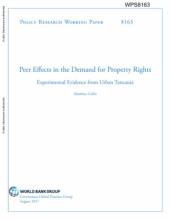Land Library
Welcome to the Land Portal Library. Explore our vast collection of open-access resources (over 74,000) including reports, journal articles, research papers, peer-reviewed publications, legal documents, videos and much more.
/ library resources
Showing items 19 through 27 of 4607.Land change in Kigali, Rwanda, is examined using Intensity Analysis, which measures the temporal stationarity of changes among categories. Maps for 1981, 2002 and 2014 were produced that show the land categories Built, Vegetated and Other, which is composed mainly of croplands and bare surfaces.
Durban is located within a global biodiversity hotspot, and still contains a wealth of biodiversity. Some of this is protected in nature reserves, but much of it is in private hands or in communal lands on the city’s periphery.
Since the early 1990s, the industrial timber plantation (Hutan Tanaman Industri - HTI) scheme has been intended to serve as a major source of timber to meet domestic and export demand.
This publication features the key provisions on land (governance) in recent relevant international frameworks including the 2030 Agenda for Sustainable Development (SDGs), the New Urban Agenda (Habitat III), the Voluntary Guidelines on the Responsible Governance of Tenure of Land, Fisheries
This study uses data from the complete computerization of agricultural leases in Malawi, a georeferenced farm survey, and satellite imagery to document the opportunities and challenges of land-based investment in novel ways.
This paper investigates the presence of endogenous peer effects in the adoption of formal property rights.
Transit subsidies in the urban area of Buenos Aires are high, amounting to a total of US$5 billion for 2012.
This paper evaluates the effect of the Rural Capacity Building Project, which aimed at promoting growth by strengthening the agricultural service systems in Ethiopia and by making them more responsive to smallholders' needs.
Despite the spread of automation and new supply chain management paradigms, logistics remains dependent on a rather specific set of skills and competencies, whether for managerial, administrative, or blue-collar jobs, such as trucking or warehousing.









